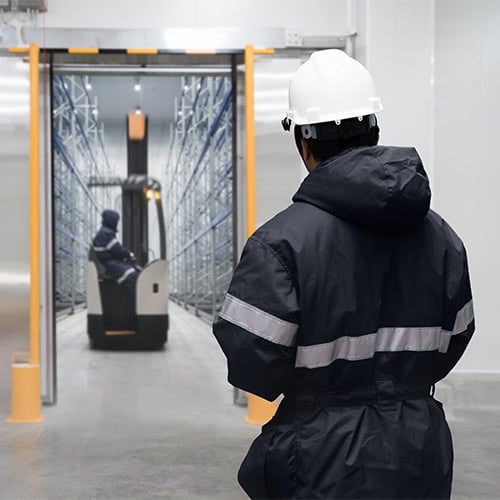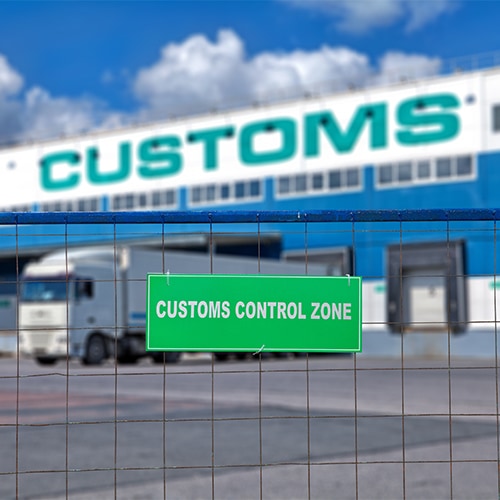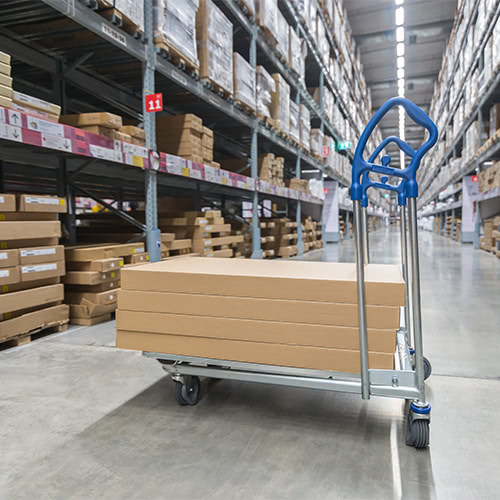
Before you can lay out your warehouse, you must first decide which type of warehouse you want to operate. At its most basic, a warehouse is a large building that stores products in bulk and houses e-commerce inventory. However, there are many different types of warehouses. Each offers unique technology, storage capabilities, and benefits. Whether you’re deciding which type of warehouse you want to start or you’re picking a warehousing service to use, our guide to the most common warehouse types will aid in your selection process.
Types of Warehouses
From private to public, technology-driven to temperature controlled, there are many types of warehouses to choose from. Discover the most common warehouse types, their pros and cons, and the businesses that benefit from them below.
1. Distribution Center

A distribution center is a comprehensive logistics operation that helps businesses store, pick, pack, and ship products to customers. Third-party logistics (3PL) companies usually own and operate distribution centers. Many distribution centers offer extra services like packing orders to create an elevated unboxing experience, overseeing returns, and helping companies manage their supply chain.
- Benefits of Distribution Centers - Distribution centers don't just store products, they aid in every aspect of order fulfillment. They have connections to major shipping carriers that will pick up orders daily. They cut costs by eliminating temporary storage, and their efficient intake, processing, storage, and distribution processes create fast and accurate order fulfillment.
- Disadvantages of Distribution Centers - Distribution centers do not offer long-term storage.
- Businesses That Benefit from Distribution Centers - E-commerce businesses, online retailers, and large retailers
Distribution Center vs Warehouse
Many modern warehouses offer fulfillment services, but there are stark differences between how traditional warehouses and distribution centers operate. Warehouses store products and distribution centers both store products and offer additional services like order fulfillment, packaging, and product mixing. Distribution centers store products on a short-term basis until orders get fulfilled, and they then distribute the products to their next/final destinations. Traditional warehouses store items for longer periods, and many do not provide shipping services.
2. Cold Storage Warehouse

Cold storage warehouses keep items at optimum or constant temperatures to prevent spoilage or quality reduction. They are necessary for everything from fresh produce to pharmaceutical supplies. They adjust the amount of cooling they add to packages to accommodate seasonal temperature shifts, and their transportation services protect product quality after it leaves their facility. Many cold storage warehouses rely on tech and automation to preserve temperatures.
There are two main types of cold storage warehouses: refrigerated and frozen. Refrigerated warehouses maintain temperatures between 32 to 50 degrees Fahrenheit. Frozen warehouses maintain temperatures between 22 to 32 degrees Fahrenheit. The purpose of a cold storage warehouse is to hold items (often fresh produce) at their ideal temperatures, preventing spoilage and extending their shelf life. Freezer warehouses hold products at a constant temperature to eliminate structural alteration or damage. Experts predict the need for frozen storage to increase because of the global frozen food market's expected 40% growth, reaching $366.3 billion by 2026.
- Benefits of Cold Storage Warehouses - Cold storage warehouses allow businesses to stock, store, and ship temperature-sensitive items like chocolate, produce, frozen goods, baked goods, and pharmaceuticals.
- Disadvantages of Cold Storage Warehouses - Costly compared to ambient temperature storage.
- Businesses That Benefit from Cold Storage Warehouses - Frozen goods providers, grocery outlets, pharmacies
3. Smart Warehouse
A smart warehouse uses technology to perform common warehouse tasks traditionally executed by human employees. Interconnected and automated technologies receive, sort, organize, and prepare items for shipment. Automation allows warehouse workers to work efficiently and catch inaccuracies. AI is also helpful for selecting the best type of shipping box for each order. This reduces costs by eliminating wasted space and extra padding.
- Benefits of Smart Warehouses - Smart warehouses decrease expenses, workload, and human error. They also provide data visibility, which aids inventory management and improves customer satisfaction.
- Disadvantages of Smart Warehouses - Due to their advanced technologies, smart warehouses are one of the most expensive warehousing options.
- Businesses That Benefit from Smart Warehouses - Any business can benefit from using a smart warehouse. They allow domestic warehouses to operate at low costs previously achieved by outsourcing warehousing needs.
Back to Top
4. Bonded Warehouse

A Customs bonded warehouse is a building or secured area where imported, dutiable merchandise is stored, processed, or used in manufacturing without having to pay duties until the items are released. The dutiable merchandise can stay in the Customs bonded warehouse for up to five years from its date of importation before the purchaser has to pay duty fees. You must check with your local Customs and Border Protection (CBP) office before storing merchandise in a bonded warehouse.
- Benefits of Bonded Warehouses - Companies that store their imported goods in bonded warehouses don’t have to pay duties on their items until they are released. If no domestic buyer purchases the imported items, the importer can then sell the merchandise for exportation and forgo paying any duty fees. They’re also known for being secure and safe storage spaces.
- Disadvantages of Bonded Warehouses - Many imported items are subjected to restrictions and cannot be stored in bonded warehouses.
- Bonded Warehouse Target Clientele - Importers and e-commerce businesses who deal with cross-border trading benefit from bonded warehouses.
5. Public Warehouse
Businesses can rent space in public warehouses to store their products. Many public warehouses offer fulfillment services for an additional fee. They allow small businesses to compete with large corporations without having to purchase a private warehousing facility. Most public warehouses offer month-to-month leases. You should select a public warehouse that will accommodate 2-day deliveries to your customers. Many public warehouses offer Warehouse Management System software that helps you anticipate your company's growth rate and will help you scale up shelf space as needed.
- Benefits of Public Warehouses - Typically, public warehouses are the most accessible and affordable warehouse type. Their short-term leases allow for mobility.
- Disadvantages of Public Warehouses - Many public warehouses lack the advanced technology of other warehouse types.
- Public Warehouse Target Clientele - Small businesses and e-commerce startups that want to store their goods.
6. Consolidation Warehouse

A consolidation warehouse is a third-party storage center where multiple businesses can take their packages. They combine multiple businesses' small shipments to make one larger, more affordable truckload. They deliver the consolidated truckload to a centralized location. From there, they break the truckload into individual shipments and send them to their purchasers. Sometimes, the consolidated shipments go through regional distribution centers before they are sent to their intended recipient. Consolidation warehouses must be strategically located so they can distribute goods to multiple sites quickly.
- Benefits of Consolidation Warehouses - Consolidation warehouses allow businesses to share the burdens of storing and shipping fees.
- Disadvantages of Consolidation Warehouses - Consolidation warehousing requires extensive coordination efforts, which can lead to delayed and inaccurate order fulfillment.
- Businesses That Benefit from Consolidation Warehouses - If you typically need to ship less-than-truckload (LTD) deliveries, consolidation warehouses allow you to send out these small shipments for a reduced fee. Since your small shipment is consolidated into a larger load, it will arrive directly at its destination, reducing en-route handling. Consolidation warehouses allow you to source, consolidate, and ship items by their demand, so you don’t have to store items for extended periods or stock a huge inventory to fulfill your customers' orders. This can help you offer free shipping to your customers.
7. Private Warehouse
As their name suggests, a private warehouse is privately owned by a manufacturer, distributor, or wholesaler. Many major online marketplaces and retailers like WebstaurantStore invest in private warehouses so they can control their inventory and their shipping timelines. Also known as proprietary warehousing, these private warehouses require a hefty financial investment and are only suitable for major operations.
- Benefits of Private Warehouses - Private warehouses offer control over warehousing operations. Companies can customize how they store their items and protect products released for shipping. Private warehouses give corporations control over their shipping timelines, providing a competitive market edge.
- Disadvantages of Private Warehouses - A business needs extensive capital to purchase a private warehouse facility, buy warehouse equipment, and hire warehouse staff. Private warehouses also limit your ability to move, locking you into a specific area. You must pay hefty property taxes when you own a private warehouse.
- Businesses That Benefit from Private Warehouses - Private warehouses are best for major corporations that need to control their warehousing and distribution expenses. In particular, corporations that sell temperature-sensitive items, chemicals, and perishables benefit from in-house warehouse management.
Back to Top
Warehousing is more than the storage of goods; it is a vast industry that offers distinct areas of specialization. As your business grows, make sure you’re using the best warehousing service for your current needs. Save our guide to the different types of warehouses so you can reference back.





